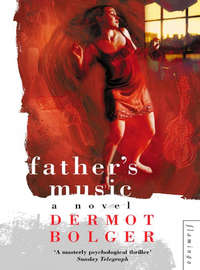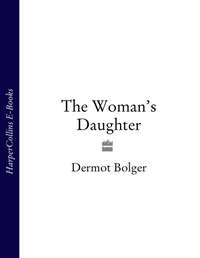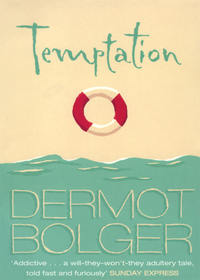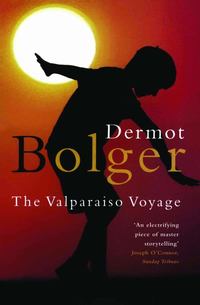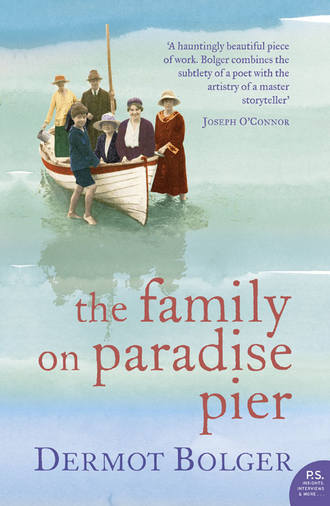
Полная версия
The Family on Paradise Pier
The group drank up, hurrying out from the pub now onto the dark quayside where the casual hiring was about to commence in a large iron-barred shed. Dockers permanently employed by the big firms brushed past them, knowing that they were guaranteed work. But for the men around Art it was a case of hoping that smaller ships had docked in the night and needed casual workers to unload them. Men emerged from other pubs and nearby streets, a swarm pressing into the shed where stevedores selected workers from the crowd. Art stood beside Liam and Tomas who didn’t know the stevedores and so found it hard to get noticed. This was capitalism at its most ruthless – men reduced to units of labour, hired for the shortest time then discarded when they grew old. Repeatedly the old carpenter pleaded with the stevedores who shook their heads. Art was impressed at how the other hungry men, while focused on their own plight, sympathised with him. This was a world Art knew little about, but he might learn more here than from a day in university.
He began to raise his hand amongst the clamouring throng as things started to look desperate for the remaining men. Liam and Tomas were amused at first, then hissed at him to stop messing. He ignored them, fighting his way forward to eventually attract the attention of a burly stevedore.
‘What the hell do you want?’
‘A day’s work. You’re hiring, aren’t you?’
‘I’m hiring men. This isn’t some sort of student lark.’
‘I’m as strong as any man you’re taking on.’
‘You’re big all right but your hands are as soft as a baby’s arse. Now piss off.’
The other men regarded Art with none of the measured sympathy they felt for the old carpenter. They stared at him coldly, like he was trying to mock them. Was it solely his accent and clothes or was there another difference that he was unaware of? Perhaps the proletariat was harder to join than the bourgeoisie. From an early age the proletariat was trained to ape their so-called betters, whereas the rich were trained to largely ignore the existence of workmen and servants. He could not recall the names of all the maids who worked in the Manor House when he was a boy but all of them would remember him.
The stevedore glanced at a shabbily dressed young man with huge shoulders standing behind Art.
‘Ready to burst a gut?’
The young man mutely nodded and the stevedore nodded too. Art noticed how their interaction was entirely based on appearances. Only five words had been exchanged. Men behind Art pushed aggressively forward and he moved back to where he was less intrusive but could still observe these rituals. The stevedore chose his crew and there was an anguished murmur, although someone amongst those left claimed that there was another ship yet to be unloaded. Art went to join Liam and Tomas at the entrance to the shed, though he sensed that their camaraderie had cooled since leaving the pub.
‘Swap shirts,’ he said to Liam.
‘Are you daft?’ The Mayoman laughed.
‘It seems a fair exchange.’
‘You won’t be saying that, being eaten alive by his fleas all night,’ Tomas joked. ‘Talk sense, man.’
Art ignored Tomas. ‘Do you want this shirt or not?’
Liam licked his lip nervously. ‘What’s the catch?’
‘None. I’ll swap you my shoes, trousers and all.’
‘Jaysus, is it to be standing in the nip you both want?’ Tomas asked. ‘I’m not staying around to be a laughing stock.’
But Tomas didn’t move and Art recognised the greed in his eyes. He was jealous that Liam had been asked. Liam sensed this too and he agreed to the swap as much to gain an advantage over his companion as to get the clothes.
Both of them went down a narrow dank alley smelling of piss between two warehouses. They undressed, first exchanging shirts and then trousers, anxious that no garment touched the filthy ground. Liam’s boots were too tight for Art, and Liam would slide about in his shoes but the Mayoman did not complain. Liam craned his neck, trying to inspect himself in his new outfit.
‘Well? Do I look like a gentleman?’
‘Yes,’ Art lied, though the way in which Liam held his body resembled an awkward servant in fancy dress. ‘Do I look like a docker?’
‘No.’ Liam was suddenly aggressive, feeling that he had been made a fool of. ‘You look like the gobshite you are. Now piss off and stop following us.’
The Mayoman stalked off to rejoin his companion and Art watched them leave, knowing that there was a new friction between those two friends. Collins’s death had been quickly forgotten in the acquisition of a good shirt. This was the corrupting influence of possessions. It was easy for Art’s college friends to discuss Marxist theory but the Ffrenches had shown that it was possible to live out your convictions. As yet he was not in a position to follow them to Russia but this morning was a first step. He wondered if Mr Ffrench dressed like this in the Moscow furniture factory where he and his wife had now been working for the past three months. They were sharing a large room there with three other couples, in a big house seized from a bourgeois family. Ffrench had described in his last letter how quickly you grew accustomed to restricted space. He did not know how he ever put up with the waste of rooms in Bruckless House which lay empty for the IRA to burn for all he cared. True life for the Ffrenches had only started since their move to Moscow. Fellow workers welcomed them and Mrs Ffrench loved how children from all the different families ran about the room, climbing onto her knee as easily as onto their mothers’ laps. Ffrench urged Art to ignore imperialist propaganda. Life under Lenin was the greatest adventure in history and the Ffrenches, like other foreigners flocking there, were privileged to be allowed to play a small role within it.
Art had sworn to join them one day. He could visualise arriving in Moscow, with Mr Ffrench embracing him at the station like a true father because – although this was awful to say – Father, who supported the new Free State, felt like a stranger.
Art walked back out to join the men at the dockyard gates and thought about Collins’s body lying in its blood-soaked uniform. The deputation that Collins led to Downing Street to negotiate the treaty had looked more like civil servants than revolutionaries. Nothing would change in Ireland, no matter which faction gained final power. The priests would rule, urging the new government to grind the poor with the same iron grasp. A degree in murder was no substitute for a degree in political theory. The new government would look like Liam, aping their former masters in clothes that didn’t fit them. The only true revolutionary was the Countess who was still enduring prison and hunger strikes, having given up everything to live in the slums with Dublin’s poor. True freedom was not freedom to acquire colonies or possessions but the freedom to be liberated from such burdens.
Art re-entered the shed where a stevedore was scanning the remaining crowd.
‘I need twenty strong men. No layabouts. Stand still so I can bloody well see you.’
Art noticed the elderly carpenter and walked towards him. The other men let him slip through their ranks, not seeing him or paying any heed but Art felt that he was being seen properly for the first time. Not as a Goold Verschoyle or public schoolboy or university student but as flesh and blood on a par with all humanity. The carpenter did not recognise him and only looked up, baffled, when Art began to speak.
‘Do you know this stevedore?’
‘For years.’
‘Say I’m your son and I’ll work beside you all day. I’ve strength enough for us both if you show me what work needs to be done.’
‘I don’t understand what you’re at, sir?’
‘Don’t call me “sir”. I’m after a day’s work like you. Help me get in and I promise to fetch and carry for you all day.’
Ten men had already been chosen. The carpenter nodded, weak with hunger. As he pushed forward, Art followed, bending down to pick up some mud and smear it through his hair. He kept his soft hands in his pockets where they could not be seen. The stevedore looked down at the carpenter and shook his head.
‘If I could do you a favour, Andy, I would. But I need muscle for this job.’
‘My son is with me,’ the carpenter called back. ‘He’s a mute but built like an ox. Look at him. We’re a team. We’ll do the work of three men between us.’
The stevedore stared at Art. The appraisal was brutal and honest, like a gaze at a horse or a boy at an Irish hiring fair. ‘Lost his tongue, eh? Could be worse, he might have lost his prick.’ The stevedore nodded curtly. ‘Let’s hope he’s half the man his father once was.’
The old carpenter pushed eagerly in through the gates at the end of the shed and Art followed into a new world, a university of toil where he had so much to learn.
SEVEN The Exiles
Donegal, Easter 1924
There were no lamps in the windows of Bruckless House when the horse and cart bumped over the small stone bridge leading onto their property. Since arriving back in Ireland yesterday Mrs Ffrench had grappled with the wild hope that somebody – the Goold Verschoyle girls or one of the servants who had been laid off a year ago – might have placed eleven lamps in eleven windows to welcome them. But there was no such illumination, merely the damp rain that so frequently settled around this isolated house which she had been longing to see for weeks – or months if she was truly honest.
She could not tell when her husband’s zeal had begun to weaken. Perhaps only in the cramped Moscow hospital where they realised there was little likelihood of him receiving proper medical attention for the terrible arm wound received in a factory accident. Poor medical conditions were not the fault of the Soviet authorities but of the belligerent European capitalist powers still trying to blockade the revolution into submission. The Moscow doctors were heroic in the loaves and fishes miracles they performed with such limited supplies – not that the medical orderly who took her husband’s details would have appreciated this metaphor from a discredited religion. Every comrade citizen had been heroic even when they did not appear to be so and violent squabbles broke out between families trying to commandeer every inch of space in the room where they all ate and slept. Even the children’s heroism was undiminished by their inability to stop crying with hunger. Heroism existed in the very air on the streets, in revolutionary banners and endless workplace meetings, in the orchestra which entertained her fellow workers in the furniture factory by playing a new style of music, composed collectively instead of being imposed by the tyrannical will of a single conductor.
If heroism alone could have healed the gash in her husband’s arm that threatened to turn septic they would still be in Moscow, walking through crowded streets at dawn to commence long factory shifts, whispering in English at night so that people sleeping nearby could not understand their intimate endearments. Their Russian was poor, but had slowly improved. They did not understand what the medical orderly had said to them until he made the shape of a saw through the air and they realised he was warning them that Mr Ffrench’s arm might be amputated. That was the first time she cried in Moscow, although she had wished to cry on many nights when the noise and cold and hard floor kept her awake, when she was forced to overhear strangers break wind or furtively make love despite having too many children already huddled like rats beneath piles of rags. When she had watched a husband beat his wife while other families ate supper as if this monstrous behaviour was unworthy of comment or intervention. When the Secret Police came to take one father away for reasons that nobody knew and were careful not to speculate about. When she woke some nights longing to be back in her old bed in Ireland with clean sheets and the other decadent bourgeois trappings they had rejected. Yet throughout all this she had been strong and supported her husband in his enthusiasm to embrace this new order.
But it had been too much to contemplate the notion of a half-qualified foreigner sawing through her husband’s arm with a dirty implement and the pair of them returning to that crowded room where she would need to physically fight for the space to nurse him and make bandages by tearing up whatever small amount of her clothes had not mysteriously vanished. Mrs Ffrench had cried that day on a dirty bench in the hospital and nothing Mr Ffrench could say had been able to penetrate the terrible grief that opened up inside her. Perhaps she had been a bad wife to show her feelings like that and was weak in not supporting her husband and the revolution. But behind the tears was the terrible fear that he would die during the operation, leaving her alone in that city which stank of hunger and terror, with nobody to protect her except the God whom she could no longer even mention.
Lenin had died in January but her god was not dead. She could not have uttered such blasphemy in Moscow, but she knew it was true because here at last was Bruckless House and her husband still had both arms intact – even if his left hand would never regain full power. God had steered them safely back home. It was God’s voice she had heard in the hospital when her husband announced quietly over her tears that his wound was a job for his old naval surgeon friend, Geoffrey. When she reminded him that Geoffrey would hardly leave his Harley Street practice for Moscow, Mr Ffrench had patted her arm with his one good hand and said that if Harley Street refused to come to them, they would simply have to go to Harley Street.
The driver stopped the cart at the front door of Bruckless House. Two figures stood there whom Mrs Ffrench had despaired of ever seeing again. Art Goold Verschoyle stepped forward with Eva. Mr Ffrench shouted a greeting and suddenly there was laughter and welcoming smiles and the driver was helping her down onto the overgrown lawn and she did not mind the rain or cold but longed to kneel and kiss the damp earth. She hugged Eva. How could she ever have found Donegal dull? How could she have been so eager to pack up and start again in Russia with nothing but the unuttered hope that a fresh start might make her body finally yield to her husband’s seed?
The cases unloaded by the driver contained nothing from Moscow but new clothes purchased by her in London while the Harley Street doctor treated her husband. Not that Geoffrey had done more than merely examine the job done by a doctor in a private Helsinki hospital after they managed to get themselves onto a train to Petrograd and cross into Finland. Mr Ffrench had kept assuring her that, having freely entered Russia, they were equally free to leave for a short time. She had tried to believe him and not seem scared by the constant inspection of their papers and how soldiers patrolling the railway system shouted at them. But her husband’s arm had oozed pus and he was in such distress that the patrols had let them proceed – less for humanitarian reasons, she suspected, than because they didn’t want to be responsible for an invalid.
In Helsinki they wired their bank in London and contacted the British attaché. Soon Mr Ffrench was in hospital and a new fear replaced Mrs Ffrench’s previous concerns. She had started to dread her husband’s recovery. Helsinki felt strange but it had no slogans on walls or agents of the All-Russian Extraordinary Commission for Combating Counter-Revolution and Sabotage seeking out class enemies. On her first night alone in her hotel bedroom she realised that she had been constantly terrified during the previous six months. Now that she had escaped from Russia she did not know if she would have the courage to ever go back.
She had dreaded Mr Ffrench announcing his intention to return to Moscow and reclaim their corner of that pigsty room. However he had kept postponing this decision because it was vital to be able to fully contribute to the new order and he feared being a dead weight who would drag down production targets for their comrades in the furniture factory. Besides he had affairs in Britain to put in order and people should be told at first hand about how exhilarating life was in the new Bolshevik state. Mrs Ffrench had agreed with everything her husband said, unable to decode what was going on in his head. All she could do was trust that, unbeknownst to him, her spiritual master, Abdul-Baha, was guiding her husband’s hand. She had decided it prudent not to force him into confronting any decision. Such careful passivity on her part got them to London and now to Donegal where the mayhem of the Irish Civil War seemed halted and tonight at least everything seemed like it had always been.
Eva Goold Verschoyle shyly released her hand from Mrs Ffrench’s grip as Art eagerly questioned her husband in the doorway.
‘How was Moscow? You have to tell me everything!’
Mr Ffrench gripped the boy’s shoulder joyously. ‘My dear boy, it is everything we dreamt of, the most just society on this earth. Mankind hasn’t known a fresh start since the Garden of Eden. But in Russia the old rules are gone and the people, not their masters, are shaping the new order. Come inside and I’ll tell you everything. Is there nobody about? I wired for your father to reinstate some servants.’
‘You did?’ Art sounded surprised. ‘I fought with Father, saying that he must have misunderstood the telegram. I mean, what would you want servants for?’
Mr Ffrench laughed. ‘What would I want them for? Dear boy, do you know the size of Bruckless House? It would be an injustice to only have two people living here. The important thing is to fill the house with life. Obviously servants is a reactionary term, but you can imagine what Papist clergy would say if I advertised for worker comrades to share my home.’
‘You mean you’re looking for local people to live here with you.’
‘Obviously. They will have the full run of their quarters and we shall have the run of ours.’
Mrs Ffrench watched the boy consider this. In truth he was a boy no longer. Eva’s tiny figure still lent her a girlish look, but Art’s shoulders had broadened out, making him look tough and strikingly good-looking. He reminded her of her brothers lost in the war. Once on a Moscow street she was convinced that she had seen her two brothers side by side ahead of her in the jostling crowd. For a moment she had let herself believe that they had not gone missing in action but simply wandered off from the terrible trenches to find their way to this new land. The hope was ludicrous, but she had been unable to stop herself pushing through the crowd, elbowing strangers and being cursed at until she touched one of their shoulders. Both men turned, neither remotely resembling her brothers now she could see their faces and she had felt their eyes undress her, taking in her manic look and the fact that she was foreign. They had looked hungry, as everyone did in Moscow, but strong and when they addressed her she knew immediately that their remarks were lewd, suggesting that they would be willing to share her body. She had run away and never told her husband what happened.
Mrs Ffrench entered the hallway of Bruckless House and almost cried to see a wood fire burning in the grate. Art and Eva had been busy, with another fire burning in the study. Returning home as a girl from her first term in boarding school, she could remember how small the rooms in her childhood home seemed, but after Moscow the opposite was true of here. Previously she had paid little attention to the size of this study, but now she realised that it was bigger than the awful room where she had been forced to sleep with the squabbling families. Sitting down on the sofa she surveyed its fantastic dimensions. She almost wished for the Goold Verschoyle children and even her husband to be gone so that she could explore each room and luxuriate in the extraordinary space. This physical greed shocked her. She was never greedy before, dutifully sublimating her needs and dreams to those of her husband. But just now she experienced an almost sexual thrill at the thought of cradling the brass doorknob of each bedroom, at pressing her palms against the huge uncracked windowpanes and placing her cheek to the cold mahogany of her dressing table.
Eva’s questions about Moscow were discreet enquiries compared to Art’s frenzied interrogation of her husband. The boy had studied Moscow street maps and knew more about the city’s layout than Mrs Ffrench had learnt in seven months of living there. He wanted to know every detail of the crowds at Lenin’s funeral and quizzed her husband about Comrades Zinoviev and Stalin and Trotsky and Kamenev as if Mr Ffrench had spent his days at internal party congresses instead of manufacturing poor-quality tables and chairs.
‘The failure of the communist revolt in Germany was a blow to Trotsky’s prestige,’ Mr Ffrench was saying. ‘It shows that the spread of the revolution will be slower than expected because Germany is ripe for change and yet the reactionary forces dug in. If our German comrades had won the day all of Europe would rise with us but there is talk of Russia needing to stand alone for a while longer.’
‘But surely Moscow won’t abandon the rest of us?’ Art argued. ‘What is the point in mankind taking one step forward and then simply stopping?’
‘Who mentioned stopping?’ Mr Ffrench replied. ‘Moscow cannot be a wet nurse to everyone. It is up to us who live here to fan the flames of revolution.’
Art went quiet and even Eva ceased to prattle on about the scraps of local gossip that Mrs Ffrench had been enjoying. There was a subtext in her husband’s remark, a Rubicon quietly crossed, a declaration she had not dared to seek from him. Hope surged inside her in direct opposition to Art’s baffled disbelief.
‘What do you mean by us?’ he enquired. ‘Surely once you recuperate you will return to Russia. I understand your desire to come back here and recover your strength, but…’
‘Desire did not enter into it,’ Mr Ffrench interjected. ‘It was necessity. Because I could seek medical treatment elsewhere it would therefore have been a selfish, counter-revolutionary act to deny a comrade treatment by clogging up a Moscow hospital. Medical supplies are crucial, as are able-bodied workers. My arm will never fully recover. The revolution is no rest home for cripples. Do you think I wish to be a parasite in Moscow, living off the sweat of my fellow workers? Mrs Ffrench and I had no desire to ever return to Donegal. Crossing into Finland was the hardest chore we ever did. I curse my disability for dragging Janet away from an environment where I saw her blossom with such happiness and purpose. But personal feelings cannot be allowed to rule. What is vital is that we each contribute to the maximum of our potential. I was shocked in London to read appalling propaganda in the capitalist newspapers. Janet and I have decided that for now our place in the revolution is here where we can counter lies and bear testament to the amazing society that we were privileged to witness and to which one day we will hopefully return. Here we can serve a purpose which you can help with too. The Irish peasants imagine that they have undergone a revolution, but they’ve just swapped one master on horseback for another. We can show them the truth – and do you know the great thing? They will listen to us because even in my short time back I see that the old respect remains for people who speak with authority. They don’t look up to this new Johnny-Come-Lately Free State government trying to lord it over them. Oh, no doubt there will be fireworks with their priests waving sticks and shouting threats from the far side of the bridge leading onto my property but they can’t stop us telling the truth to those who will listen.’
Mrs Ffrench saw Art trying to shape a question, but no words came because the boy needed to believe in her husband. What did she believe? She watched her husband grow so animated that soon Art was caught up in his enthusiasm and asking questions again about the factory and the workers’ debates. Both she and Eva stopped talking so that they could listen too, because his version of Moscow was so wonderful that it felt like a poultice on her mental scars. It was simpler not to argue or even contradict him in her mind because maybe he was telling the truth and she had been too preoccupied with her own petty concerns to appreciate the wonder of revolution.



